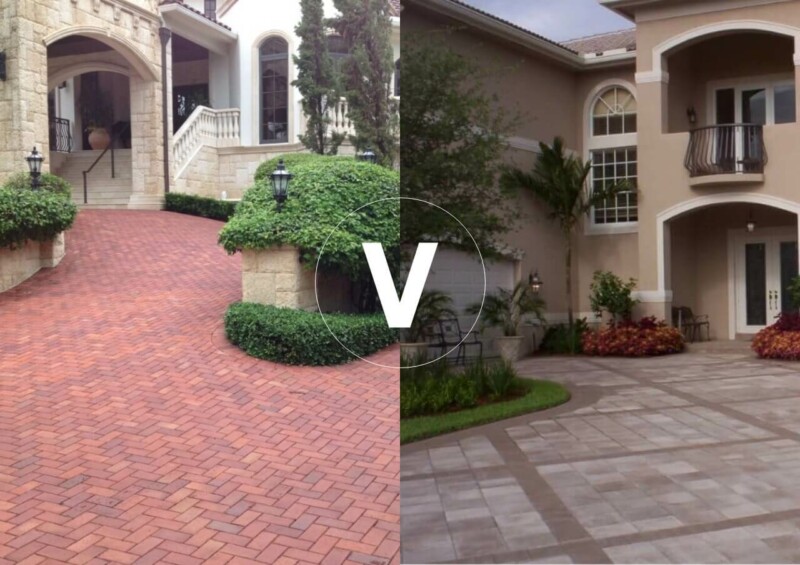Clay Pavers vs. Concrete Pavers: Which Is the Best Option for Your Home?

Brick pavers have quickly become the most popular building material for outdoor spaces. They’re versatile enough for patios, walkways, pool decks, and countless other areas, strong enough to resist Florida’s harsh weather conditions and wear and tear, and they look better than traditional concrete slabs.
Perhaps the most significant benefit of brick pavers is their material variety. Property owners have several options for these structures, but it usually comes to a debate between a clay paver vs. a concrete paver.
Despite the popularity of both, many people don’t know the differences or similarities between them. Below, we’ll break down the elements that set these pavers apart, the situations where they’re most effective, and why BrickAmerica is the best place to order pavers in any material.
Shared Benefits
Before breaking down the differences in the clay paver vs. concrete paver debate, it’s vital to know that both materials are largely similar and will do the job well. Each is visually appealing, easy to customize, strong, and easier to maintain than traditional outdoor surfaces.
Specifically, the concrete and clay bricks pavers at BrickAmerica stand apart from the crowd. We offer multiple size, shape, and color options so that you can build your perfect outdoor space without compromise.
Clay pavers offer a traditional brick appearance, while concrete often looks sleeker and more contemporary. However, regardless of your preference, each will elevate your home’s curb appeal and property value.
Clay Paver vs. Concrete Paver: Key Differences
Neither clay nor concrete pavers are objectively better than the other. However, the three crucial distinctions in the clay paver vs. concrete paver discussion will help you determine the best fit for your home.
Cost
Clay pavers cost roughly 20% more than their concrete counterparts. Part of that cost difference is for unique benefits not included in concrete that we’ll examine later, but the other part comes down to the construction difficulty. Clay pavers are harder to cut and shape than concrete, and that extra labor inflates the price tag.
Strength
Most people think of concrete as a high-durability material, but it’s more fragile than many realize. Specifically, concrete has roughly one-third the strength of natural clays put through the paving process, so concrete pavers will chip and crack faster than clay ones.
Concrete pavers’ durability also limits where you can use it. For example, since concrete wears down quickly, concrete pavers might not make an excellent driveway material where they must endure heavy vehicle weight. On the other hand, clay bricks will put up a good fight against heavy force.
Aesthetic Value
Even though clay pavers and concrete pavers start equally strong visually, concrete loses its visual appeal much quicker than clay. This is because concrete can erode with exposure to rain and temperature changes, which drains its color. Meanwhile, clay resists those elements.
Although you can repave concrete to restore its color, the material typically fades within three to five years, while clay resists fading altogether. Additionally, unsealed concrete pavers are often homes for moss growth, while clay pavers are typically tight enough to keep moss from settling in.
Where Each Type of Paver Works Best
Now that you know where you stand on the clay paver vs. concrete paver debate, we can look at where each material is at its most effective.
Clay pavers work better than concrete in heavy foot traffic areas where visual brilliance is essential. For example, spots like driveways and regularly used entryways are fantastic for clay because clay bricks won’t buckle under the weight and use. Additionally, they’ll hold onto their color for decades, giving your property a long-lasting visual boost.
On the other hand, concrete pavers are perfect fits for covered patios without heavy furniture. If you shield it from inclement weather, concrete makes an ideal material for patios that won’t break the bank. Concrete also works well for lightly-used walkways or outdoor spaces that need a contemporary aesthetic.
High-Quality Brick Pavers in Florida from BrickAmerica
No matter how you feel about the clay paver vs. concrete paver discussion, you can find the perfect material for your outdoor space at BrickAmerica. We offer the widest selection of pavers in Florida, each with the strength and visual appeal to boost your property’s value and curb appeal. We also offer natural stone and porcelain pavers for high-quality, non-standard options.
Call BrickAmerica today at 954-374-0660 to learn more about our paver options or shop for products, get expert advice and a free estimate.

